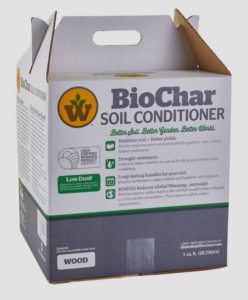Jan 25, 2021Soil conditioner created by packaging maker from paper waste
Farmers and agriculture markets stand to get tons of soil additives converted from wood waste once headed to landfills, thanks to a partnership between sustainable packaging leader DS Smith and premium soil producer Wakefield Biochar.
 Wakefield Biochar will look to turn waste produced by DS Smith’s Riceboro, Georgia paper mill into enhanced, sustainable soil inputs for soil conditioning and remediation.
Wakefield Biochar will look to turn waste produced by DS Smith’s Riceboro, Georgia paper mill into enhanced, sustainable soil inputs for soil conditioning and remediation.
With the paper industry seeing record demand for packaging products because of the pandemic-fueled increase in e-commerce and shipping, paper mills are producing more wood ash, also called biochar, a high-carbon and mineral rich by-product of the paper making process.
“The wood fibers used in the paper-making process are renewable by nature, and our sustainability strategy demands that we carefully manage our forests and ensure that little fiber is wasted in our production process,” said DS Smith’s Giancarlo Maroto, managing director, paper, forestry and recycling, North America. “Working with Wakefield to convert our excess wood ash for growers as a way of rejuvinating their soil is an ideal solution for DS Smith, because the raw materials harvested from our forests are recycled back to the land in a circular model.”
Wood ash is a by-product of the thermal process that powers a paper mill. When converted to nutrient-rich biochar by Wakefield, it will contain many elements that trees need for growth, such as calcium, potassium, magnesium and iron. Since most of these elements are extracted from the soil and atmosphere during a tree’s growth, they are common in the environment and essential in production of crops and forests.
About 3 million tons of wood ash are produced annually in the U.S. While about 80% of all material is applied to land in the Northeast, around 10% is applied in the Southeast, with the majority being used as landfill cover.
“The major constraints to mass distribution and application of biochar to farmers are transportation costs, fertilizer analysis and logistics,” said Wakefield Biochar President Tom Marrero. “Paper mills are producing wood waste at high volumes, and seeing ever-increasing disposal costs. With our partnership, we will handle the testing, licensing, transportation and sale of the biochar once it leaves their facility. Wakefield Biochar is here to provide sustainable and environmentally impactful alternatives for DS Smith’s wood ash.”
Over a short period of time, DS Smith has diverted more than 150 tons of wood ash to Wakefield Biochar, and hundreds more tons are expected to be diverted in 2021. The average farmer will spread about 2 tons of biochar per acre to boost soil health.
Wakefield’s proprietary process invloves transporting the wood ash to a central faclity nearby where it’s analyzed and augmented with additional nutrients as needed and converted into its “Better Soil. Better World” line of biochar products.
DS Smith’s purpose is to “Redefine Packaging for a Changing World,” and as part of its recently launched “Now and Next Sustainability Strategy” and commitment to the circular economy, the company will use packaging and recycling to replace problem plastics, reduce customer carbon and eliminate consumer packaging waste by 2030.







